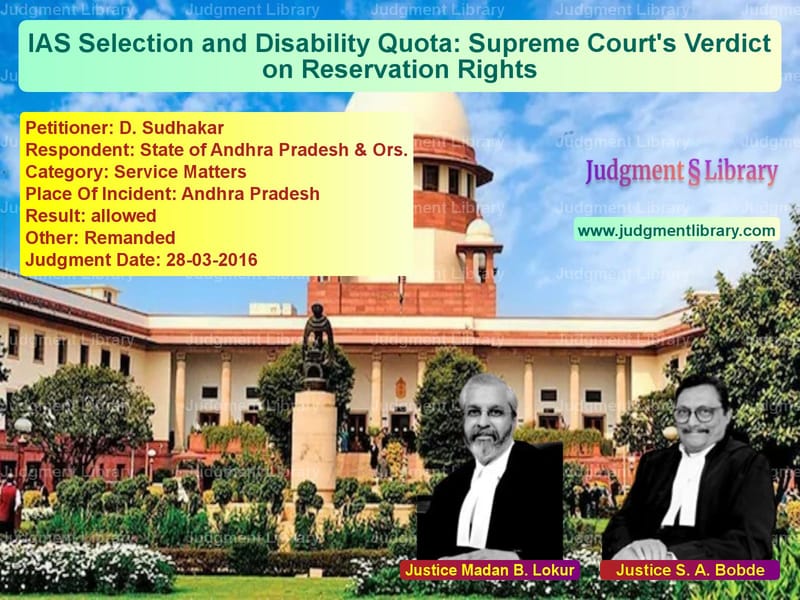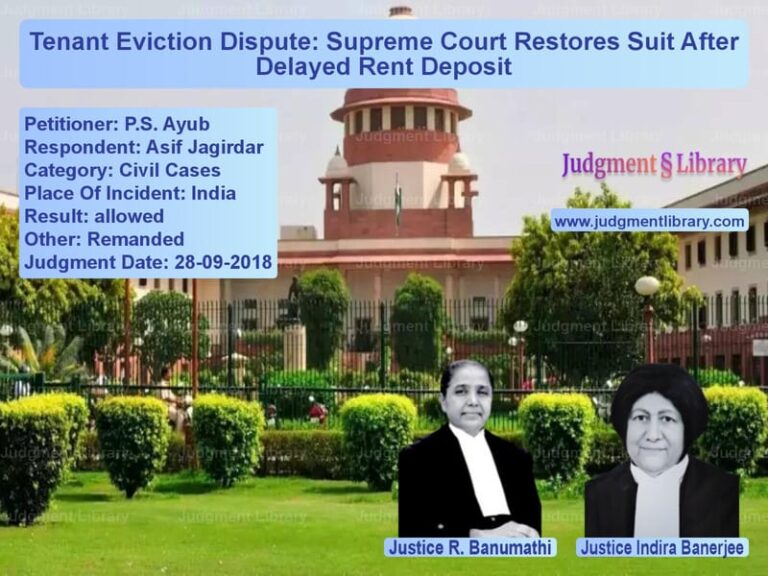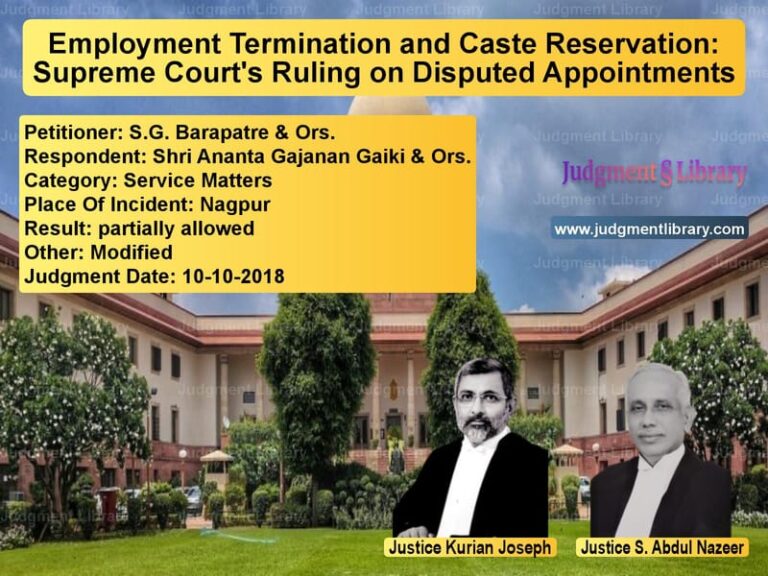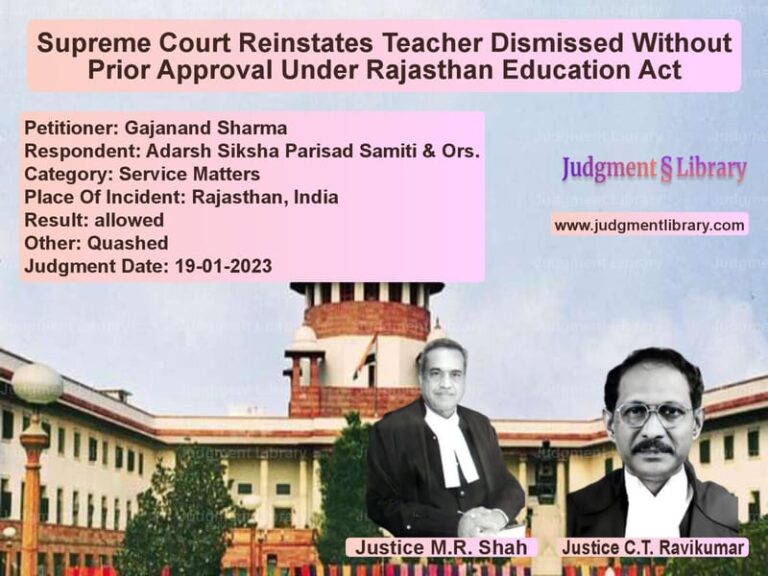IAS Selection and Disability Quota: Supreme Court’s Verdict on Reservation Rights
The case of D. Sudhakar vs. State of Andhra Pradesh & Ors. brings forth significant legal issues concerning reservations for persons with disabilities in civil service appointments, particularly within the framework of the Indian Administrative Service (IAS).
The petitioner, a physically handicapped officer from the Scheduled Caste (SC) category, claimed that he was unfairly denied selection for the IAS despite the legal provisions for reservation under the Persons with Disabilities (Equal Opportunities, Protection of Rights and Full Participation) Act, 1995 (PWD Act).
The judgment revolves around the petitioner’s contention that he was eligible for selection under the non-state civil services officers’ quota, but the selection committee refused to shortlist him for appointment to the IAS. This case is particularly crucial in defining the extent of reservation rights and their applicability in cases of lateral selection.
Background of the Case
The petitioner was directly recruited as a Regional Transport Officer in 1990 and was later promoted to the position of Joint Transport Commissioner in 2008. Despite his service record and being shortlisted for IAS selection in 2002, he was never selected. The petitioner argued that his exclusion violated the reservation policy under Section 33 of the PWD Act, which mandates a 3% reservation for persons with disabilities.
In 2010, after repeated rejections, the petitioner approached the Central Administrative Tribunal (CAT), Hyderabad Bench, challenging the selection process and seeking inclusion in the IAS shortlist.
Petitioner’s Arguments
The petitioner relied heavily on the Supreme Court’s ruling in Union of India v. National Federation of the Blind, arguing that:
- The state violated the 3% reservation mandate under the PWD Act by failing to shortlist him for IAS selection.
- The non-inclusion in the selection list amounted to discrimination against disabled candidates.
- As a Scheduled Caste and physically handicapped officer, he was doubly disadvantaged by the selection process.
He further claimed that the selection committee did not provide any reasonable justification for not considering him under the disability reservation quota.
Respondents’ Arguments
The State of Andhra Pradesh and the Union of India opposed the petition, stating:
- The IAS (Appointment by Selection) Regulations, 1997, do not explicitly provide for reservation in lateral entry selections.
- The selection committee reviewed all eligible candidates and found the petitioner unqualified based on merit.
- There was no legal mandate to extend the 3% disability reservation to selections from non-state civil service officers.
Tribunal’s Ruling
The Central Administrative Tribunal ruled partially in favor of the petitioner, stating that:
- The shortlisting process was flawed and lacked transparency.
- The selection process for IAS candidates was unfair.
- However, the Tribunal refused to direct the inclusion of the petitioner’s name in the selection list, citing an earlier ruling that there was no reservation provision in the IAS appointment by selection regulations.
High Court’s Judgment
The petitioner then moved the Andhra Pradesh High Court, which dismissed his writ petition on February 20, 2014, ruling that:
- The petitioner’s claim was based on an office memorandum from December 3, 2013, which had a prospective effect and could not be applied retroactively.
- The 3% reservation for persons with disabilities in IAS selection could not be enforced for past selections.
- The petition lacked merit and was not maintainable.
Supreme Court’s Verdict
The Supreme Court took a different approach, recognizing the complexity of the legal questions involved:
- The case required interpretation of Section 33 of the PWD Act in the context of IAS selection rules.
- The matter was interlinked with other pending civil appeals, including State of Haryana v. Viklang Sangh and H.C. Sharma v. N.D.M.C.
- The Court granted leave and tagged the case with related pending appeals to ensure a comprehensive ruling on the issue.
Impact of the Judgment
This case highlights critical questions about reservation policies for disabled candidates in elite civil service positions. The Supreme Court’s decision to club the case with similar appeals underscores the need for a consistent and legally sound interpretation of disability reservation laws in lateral recruitment.
The judgment will have far-reaching consequences in determining whether persons with disabilities can claim reservation benefits in the selection process for high-ranking administrative posts, such as the IAS.
Don’t miss out on the full details! Download the complete judgment in PDF format below and gain valuable insights instantly!
Download Judgment: D. Sudhakar vs State of Andhra Prad Supreme Court of India Judgment Dated 28-03-2016-1741853971892.pdf
Direct Downlaod Judgment: Direct downlaod this Judgment
See all petitions in Employment Disputes
See all petitions in Recruitment Policies
See all petitions in Public Sector Employees
See all petitions in Judgment by Madan B. Lokur
See all petitions in Judgment by S. A. Bobde
See all petitions in allowed
See all petitions in Remanded
See all petitions in supreme court of India judgments March 2016
See all petitions in 2016 judgments
See all posts in Service Matters Category
See all allowed petitions in Service Matters Category
See all Dismissed petitions in Service Matters Category
See all partially allowed petitions in Service Matters Category







